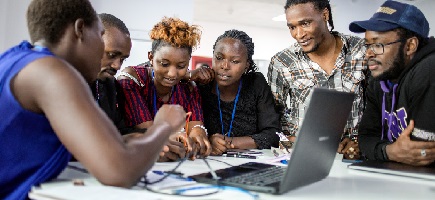
30.09.2021
Turkey: job opportunities in a new home
Training opens up career opportunities in the Turkish IT sector for young jobseekers from Turkey and Syria.
Almost 7 million Syrians have left their home country on account of the civil war that has been raging there since 2011. Escaping violence, persecution and hunger, they have sought refuge in other countries. Turkey has taken in over 3.6 million Syrians, more than any other country in the world. The economic situation is already difficult in Turkey, making it harder for the refugees to find well-paid jobs. Many therefore work in the informal sector without a work permit, eking out a living by taking on badly paid casual jobs, for example in factories or on building sites. There are other options, however, with a large number of training opportunities available – provided through cooperation with chambers of trade and industry, in private companies and in the IT sector.
Aydin Davutoğlu, who is now 22, is one of the people who has benefited from this training. He was only 16 years old when a bomb exploded next to his school in Damascus in February 2013. He arrived in Turkey with his family in 2014 via Jordan and Yemen. In Istanbul, he studied computer science and went on to specialise in website development. The training took place at ‘coding bootcamp’ – a kind of training camp for programmers – run by the Deutsche Gesellschaft für Internationale Zusammenarbeit (GIZ) GmbH with two partners: the U.S. non-governmental organisation Re:Coded and the non-profit network Impact Hub, an exchange and knowledge platform for social entrepreneurs. The courses teach both refugees and young Turks what they need to know to find jobs in the growing IT sector. In 2020, a total of 40 students – some 50 per cent of whom were women – completed the training course, which is sponsored by the German Development Ministry.
From refugee to software developer
Aydin soon realised how much his skills were in demand. In October 2020, only two months after completing the course, he found a job as a software developer at an international digital company: ‘At the moment, I’m just really happy to have started my job. One day I might start something of my own, but first of all I need to gain some experience. So maybe in 10 years or so.’
Around 3,000 people have already completed a vocational training course like Aydin’s, and the same number have found short-term employment with the project. Almost half of those benefiting are women. Overall, about 40 per cent have found longer-term employment. Jobs like these not only provide income, but also a place where refugees can get to know their Turkish colleagues better. That helps people like Aydin to find their feet in their new country: ‘I finally feel at home now and have found a career that I would like to pursue. That makes me happy.’
